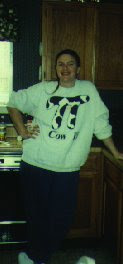So amidst the headache, stuffy nose, and feelings of misery, I decided to catch up on my reading list and see what I could do in diminishing my TBR pile. Here are quick reviews of what I’ve discovered (or re-discovered):
 The Darkest Pleasure
The Darkest PleasureBy Gena Showalter
This is the third book in Gena Showalter’s newest series, the Lords of the Underworld Trilogy. Harlequin released the trilogy back to back – how I think all series books should be released! – with The Darkest Night in May, The Darkest Kiss in June, and The Darkest Pleasure in July. And yes, I know it’s not quite July yet, which made me especially happy to see The Darkest Pleasure on the bookshelf! This is a series that puts a different twist on the myth of Pandora’s Box. If you love a fast-paced, action-packed, sexy read with an interesting, never-before-seen plot, eat-your-heart-out alpha heroes, and heroines who don’t back down from danger – or the men who represents it – then this is the series for you!
Reyes is a man possessed. Bound by the demon of pain, he is forbidden to know pleasure. Yet he craves a mortal woman, Danika Ford, more than breath and will anything to claim her – even defy the gods. Danika is on the run. For months, she’s eluded the Lords of the Underworld, immortal warriors who won’t rest until she and her family have been destroyed. But her dreams are haunted by Reyes, the warrior whose searing touch she can’t forget. Yet a future together could mean the death of all they both hold dear …
 Worth Any Price
Worth Any PriceBy Lisa Kleypas
Once again, I re-discovered my love for historicals. Lisa Kleypas has always been a favorite author of mine. She writes engaging, very sensual, very sexy stories that transport you and every time. Kleypas, along with Stephanie Laurens, in my humble opinion, are two of the handful of authors who pioneered HOT historicals set in the English Georgian, Regency, and Victorian Eras. If you enjoy historicals and have never read a Lisa Kleypas book, you’re certainly missing out!
What is the price of love? Nick Gentry is reputed to be the most skillful lover in all England. Known for solving delicate situations, he is hired to seek out Miss Charlotte Howard. He believes his mission will be easily accomplished – but that was before he met the lady in question. For instead of a willful female, he discovers one in desperate circumstances, hiding from a man who would destroy her very soul. So Nick shockingly offers her a very different kind of proposition – one he has never offered before. He asks her to be his bride. And he knows that this will be much more than a union in name only. For he senses what Charlotte does not yet know – that her appetite for sensuality matches his own. But what Nick learns surprises him. For while London’s most notorious lover might claim Charlotte’s body, he quickly discovers it will take much more than passion to win her love.
 The Very Thought of You
The Very Thought of YouBy Lynn Kurland
Okay, what more can I say. The mere mention of the author’s name says it all. Lynn Kurland is the standard for a satisfying read, every time. She’s an author who hasn’t given in to the demands of romance trends. She stays true to her stories, which are sweet, tender, historically accurate, and very satisfying love stories. Her stories will touch you, make you laugh, make you cry, and make you care for each individual character that is portrayed. I admit, I read love hot romances. The hotter, the better. Lynn Kurland is the ONLY author I read that doesn’t do HOT, and I’m not left feeling bereft and wanting more. She layers layers of sensuality with witty and engaging dialogue, and memorable characters that stay with you long after the book has finished. After putting down a Lynn Kurland book, I always sigh, thoroughly satisfied. I dare you to read a Lynn Kurland book and not enjoy it!
Alexander Smith had found success in the world of corporate takeovers – but not happiness. That had always escaped him … along with true love. Then, at the MacLeod Keep in Scotland, he found a pirate map that miraculously answered his yearnings – with a journey to another time. And when he was captured in Medieval England by Margaret of Falconberg, a fierce beauty hidden in knight’s armor, he rediscovered his own chivalrous – and passionate – heart …
Surprise Read:
 Unmasqued
UnmasquedBy Colette Gale, An Erotic Novel of The Phantom of the Opera
This was an enjoyable, surprising read. It takes the tale of The Phantom of the Opera and puts an erotic twist on it. The story is definitely one you’ve never heard before. It is the story of The Phantom of the Opera as it’s never been told before. This book is for all the women who thought Christine should have stayed with the Phantom.


























